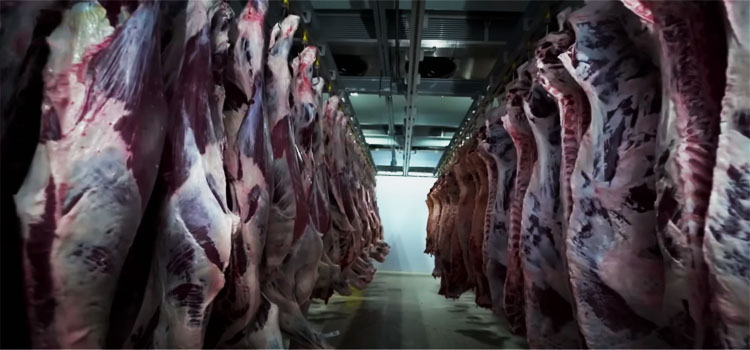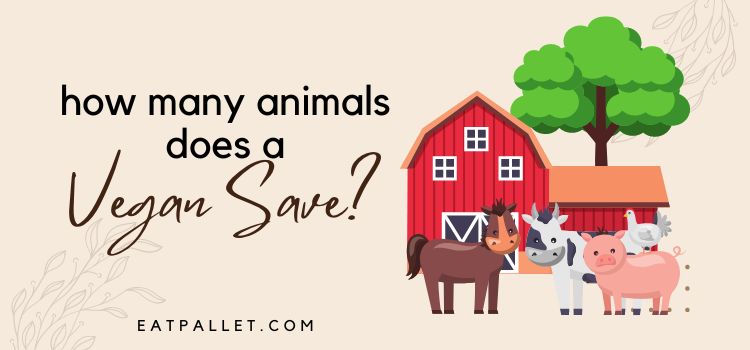Last Updated on September 15, 2024 by Shari Mason
My food journeys have led to an **amazing discovery**. The **choices** about what we eat really **impact** our planet.
One such choice that has captivated my attention is adopting a vegan lifestyle. Curiosity led me to uncover a surprising question: just how many animals does a vegan save? Here’s what I found out.
Rough Estimate On The Number Of Animals Vegans Save
It’s challenging to provide an exact number due to varying dietary habits and agricultural practices.
However, according to a study, it’s estimated that an average vegan saves around 100 to 200 animals per year, considering both land and marine animals.
Keep in mind this is a rough estimation, and actual numbers may vary.
Read:
How Does A Vegan Diet Contribute To Animal Welfare?


A vegan diet [1] contributes to animal welfare by directly reducing the demand for animal products, which minimizes animal exploitation and suffering.
“Being a vegan just helps me build up my self-esteem. I feel good about it every time I eat a meal.”
– Steve-O, Entertainer
By abstaining from consuming meat, dairy, and eggs, vegans actively reject the practices of factory farming and other forms of animal agriculture that often involve inhumane conditions.
What Role Does Veganism Play In Reducing Animal Suffering?
Veganism is vital in reducing animal suffering by directly addressing the demand for animal products and challenging animal agriculture practices.
This conscious decision promotes compassion and raises awareness about animal treatment’s ethical considerations, leading to reduced exploitation and suffering.
Read: Should Vegan Mayo Be Refrigerated?
Does Veganism Have Environmental Benefits Too?


Absolutely, veganism offers significant environmental benefits. Animal agriculture is a major contributor to deforestation, greenhouse gas emissions, and water pollution.
Individuals reduce the demand for animal products, decreasing the need for vast land and resources used in animal farming.
“Every day, a vegan’s choices resonate through time, creating a harmonious ripple that saves countless lives, speaks for the voiceless, and nurtures a world where compassion reigns over cruelty.”
Eat Pallet Restaurant & Food Advice
This reduction in land use helps preserve natural habitats and biodiversity. Moreover, plant-based diets have a lower carbon footprint than diets that include animal products.
Read: Vegan Options To Roast Over A Fire
Other Positive Effects Of A Vegan Lifestyle
- Health Benefits: A well-planned vegan diet, rich in fruits, vegetables, whole grains, legumes, nuts, and seeds, can provide ample nutrients while reducing the risk of chronic diseases such as heart disease, high blood pressure, type 2 diabetes, and certain types of cancer. It promotes a higher fiber intake, antioxidants [2], and plant-based protein, typically lower in saturated fat and cholesterol.
- Ethical and Moral Alignment: Veganism aligns one’s dietary choices with personal values of compassion, non-violence, and the recognition of the inherent value of all living beings. It fosters a sense of empathy and ethical mindfulness towards animals and encourages a more harmonious relationship with the natural world.
- Sustainability: A vegan lifestyle contributes to more sustainable food production systems by reducing reliance on animal agriculture. It conserves natural resources, reduces greenhouse gas emissions, and minimizes the ecological footprint associated with animal farming, helping to create a more sustainable future for the planet.
- Global Food Security: Shifting towards plant-based diets can alleviate food scarcity and improve global food security. Many crops grown worldwide are used to feed animals for meat production. Veganism helps ensure food availability for a growing global population by redirecting these resources toward direct human consumption.
- Cultural and Culinary Exploration: Embracing a vegan lifestyle encourages culinary creativity and the exploration of diverse plant-based foods. It opens up a world of flavors, textures, and cuisines that may have been previously overlooked. Veganism can inspire individuals to discover new foods, experiment with recipes, and broaden their culinary horizons.
- Personal Growth and Connection: Many people find that adopting a vegan lifestyle promotes personal growth, self-reflection, and a deeper connection with nature. It encourages individuals to be more mindful of their choices, cultivate compassion, and make conscious decisions that align with their values. It can also foster community and connection with like-minded individuals with similar ethical and lifestyle choices.
FAQs
u003cstrongu003eWould the world survive if everyone was vegetarian?u003c/strongu003e
Yes, the world could sustainably support a vegetarian population. By transitioning to a vegetarian diet, which excludes meat but may include dairy and eggs, the environmental impact of animal agriculture would significantly decrease. u003cbru003eu003cbru003eIt would alleviate pressure on land and water resources, reduce greenhouse gas emissions, and help preserve biodiversity.
u003cstrongu003eWhat is more strict vegan or vegetarian?u003c/strongu003e
Veganism is generally considered more strict than vegetarianism.
Key Takeaways
It is challenging to provide an exact number of animals that a vegan saves, as it depends on various factors such as the duration of veganism, individual dietary choices, and lifestyle practices.
However, individuals significantly reduce animal suffering and exploitation by adopting a vegan lifestyle.
Veganism helps save animals by avoiding consuming meat, poultry, fish, dairy, eggs, and other animal-derived products.
By doing so, vegans decrease the demand for animal agriculture, reducing the need for intensive farming practices, the destruction of natural habitats, and the associated negative impacts on animal populations.
While the exact number may vary, each individual’s choice to go vegan contributes to a more compassionate and sustainable future for animals.
References:
- https://www.healthline.com/nutrition/what-is-a-vegan
- https://www.nccih.nih.gov/health/antioxidants-in-depth
- Can You Put an AC Unit in the Kitchen? - September 27, 2024
- What Cheese Does Olive Garden Use? Discover Their Signature - September 27, 2024
- How to Cancel a Pizza Hut Order? Quick & Easy Guide - September 24, 2024


